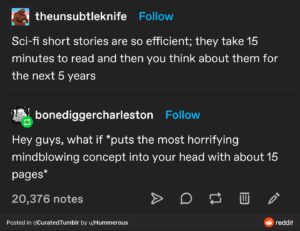 It’s strange to me how people are increasingly consuming short-form content like TikTok videos or Instagram Reels, but won’t read short stories. Some flash fiction is short enough to read in a few minutes, but the desire for novels and series of books instead of short stories is probably an effect of the decline of the magazine. This doesn’t mean authors shouldn’t write short stories. Some incredibly famous authors like Isaac Asimov, Philip K. Dick, and Kurt Vonnegut used to have their short stories published in magazines like Galaxy Science Fiction, Playboy, or Collier’s. Even modern authors like Ted Chiang have found success with their short stories despite the limited audience.
It’s strange to me how people are increasingly consuming short-form content like TikTok videos or Instagram Reels, but won’t read short stories. Some flash fiction is short enough to read in a few minutes, but the desire for novels and series of books instead of short stories is probably an effect of the decline of the magazine. This doesn’t mean authors shouldn’t write short stories. Some incredibly famous authors like Isaac Asimov, Philip K. Dick, and Kurt Vonnegut used to have their short stories published in magazines like Galaxy Science Fiction, Playboy, or Collier’s. Even modern authors like Ted Chiang have found success with their short stories despite the limited audience.
I started out my journey as an author by writing short stories just to get the ideas out of my head. These stories focused on a singular concept and explored it in a few thousand words. A lot of speculative fiction revolves around a dense exploration of “what if” scenarios that don’t highlight the characters as much as the ideas the author wants to convey.
Short stories are plot-driven.
With this in mind, what are the benefits of writing short stories? If you’re starting out as a writer, short stories are a great way to test out ideas you may have without committing to a whole novel first. It’s easier to ask people for feedback on something that’s 5,000 words compared to 50,000 so you can fix any issues with it before you expand into a longer format. In fact, my first novel, First Name Basis, is basically a collection of six short stories set in the same universe and with the same cast of characters—just with different locations for each chapter/story. Flowers for Algernon is a perfect example of a short story that was later expanded into a larger book.
Sometimes, a short story has room to grow into something bigger. There’s usually enough tangential content to expand into a novella or novel. Both my short stories, “Soul Photographer” and “Ironed Man” had enough lore I uncovered in my research to warrant more exploration of these ideas. That I could try out the base concept of these ideas first helped confirm that they were stories I eventually want to flesh out into full-length novels. Recently, I expanded a short story into a novella, which allowed me to better explore the character and widen the idea into something deeper than just “an origami ninja.”
Break the mold with short stories.
Short stories don’t even have to follow a classic narrative structure to be of some use. Take, for instance, a few of the short stories I wrote for NaNoWriMo in 2021. “Travel with Rick Steves: Corporations Through the Back Door” and “In search of the mythical Nar” were written more as world-building notes than stories with actual plots. I even used “In search of the mythical Nar” as a foundation to write “The Physics of Equus Monoceros.” I had to write the 5,000+ words of “In search of the mythical Nar” first to understand what I wanted to convey in the 3,500 words of the follow-on short story.
If you don’t know what to write or if you’re looking for a challenge (or to expand your writing repertoire), writing prompts are a great place to start. There are plenty of places online that have prompts, but the most useful prompts I’ve found have come from writing contests or anthologies (i.e., a collection of short stories based on a theme). Not every prompt speaks to me, but there has been enough that I felt compelled to write something for it. Even if my stories don’t win a contest or are accepted into an anthology, they still exist and I still gained something from writing them. Saving rejected short stories and polishing them or tweaking them for a different prompt can prove fruitful in the future. Case in point, I wrote “Kami’s Curse” because it was a fun idea, but when an anthology prompt for “unusual shifters” came along, I submitted it and it was accepted.
Want to get published? Write a short story!
Despite fewer readers of anthologies and magazines, having your short stories accepted in these formats adds gravitas to your bibliography. It’s much easier to be “traditionally” published through anthologies and magazines than traditionally publishing a novel through an agent. The more stories you have published in a professional context, the more seriously people will take your writing. This may lead some readers to find you and read your other works. You can also network with the other authors who were published in the same anthology or magazine. Overall, short stories are an important part of a writer’s toolbox. They are easy prototypes for larger stories and are often the best way to win contests or gain exposure through anthologies. If you’re not writing short stories, you should start writing short stories.
What’s the most memorable short story you’ve read?
How fast can you write a short story? A week? A day?
If you had time to read a chapter of a book, would you instead read a short story?
